
Baker's Game is a patience or solitaire card game similar to FreeCell. It predates FreeCell, and differs from it only in the fact that sequences are built by suit, instead of by alternate color. This makes the game more difficult to complete successfully.

A Game of Thrones: The Card Game is an out-of-print collectible card game produced by Fantasy Flight Games. It is based on A Song of Ice and Fire, a series of novels written by George R. R. Martin. The first set was Westeros Edition and was released in August 2002. It has since won two Origins Awards. The game's primary designer is Eric Lang, the lead developer is Nate French, with Damon Stone serving as associate designer.

Doomtown: Reloaded is an expandable card game based on the Deadlands role-playing game. It was originally a collectible card game that ran from 1998 through 2001 and was revived as the Reloaded version in 2014. It was published by Wizards of the Coast (WotC) under license to Pinnacle Entertainment Group until January 2000, when WotC quit production and the license transferred to Alderac Entertainment Group.
Vampire: The Eternal Struggle is a multiplayer collectible card game published by White Wolf Publishing. It is set in the World of Darkness and is based on the Vampire: The Masquerade roleplaying game.
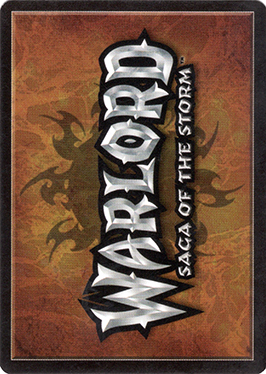
Warlord: Saga of the Storm is a collectible card game designed by Kevin Millard and David Williams. It was produced by Alderac Entertainment Group since its introduction in April 2001 until January 2008, when they announced they were ceasing its production. In place of AEG, German company Phoenix Interactive has licensed the rights to produce the game and printed their first set, Fourth Edition, in July 2008. The longer official name is almost always shortened to Warlord and the subtitle "Saga of the Storm" is often used informally to refer to the original base set of cards. The game is unrelated to an earlier, similarly named CCG, Warlords.

The Pirates Constructible Strategy Game is a tabletop game manufactured by WizKids, Inc., with aspects of both miniatures game and collectible card game genres. "Pirates of the Spanish Main" is the world's first "constructible strategy game," referring to the mechanics of creating game pieces from components that punch out of styrene cards. The game was created by Jordan Weisman and designed by Mike Mulvihill, Ethan Pasternack, James Ernest, and Mike Selinker. It was released in early July 2004. There was also an online computer game based on Pirates of the Spanish Main by Sony Online Entertainment called Pirates CSG Online, which ended on January 31, 2011.

Bang! is a Spaghetti Western-themed social deduction card game designed by Emiliano Sciarra and released by Italian publisher DV Giochi in 2002. In 2004, Bang! won the Origins Award for Best Traditional Card Game of 2003 and Best Graphic Design of a Card Game or Expansion.

Alhambra is a 2003 tile-based German-style board game designed by Dirk Henn. It was originally published in Germany by Queen Games in a language-interdependent version; an English-specific version was released in North America by the now-defunct Überplay. The game is an Arabian-themed update, set during the construction of the Alhambra palace in 14th century Granada, of the 1998 stock trading board game Stimmt So!, which in turn was an update of the 1992 mafia influence board game Al Capone; the original version was subsequently released as Alhambra: The Card Game. Upon its release, Alhambra won numerous awards, including the Spiel des Jahres award. Its success has led to the release of numerous expansion packs and spin-off games, and is becoming Queen Games' flagship franchise.
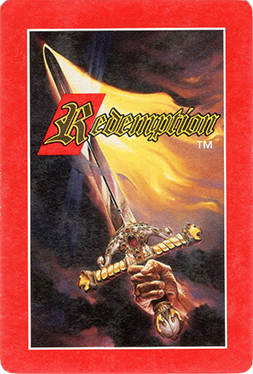
Redemption is a collectible card game based on the Bible. It involves Biblical characters, places, objects, and ideas. The object of the game is for players to use their Heroes to rescue Lost Souls by defeating their opponent's Evil Characters, with the first player to rescue five Lost Souls winning the game. Redemption was first published in July 1995 by Cactus Game Design and its creator, Rob Anderson, continues to develop and produce the game and is the final authority on rulings.
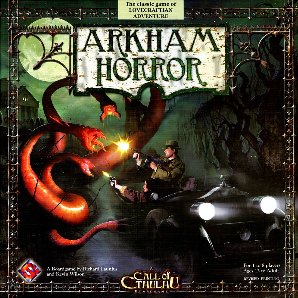
Arkham Horror is a cooperative adventure board game designed by Richard Launius, originally published in 1987 by Chaosium. The game is based on Chaosium's roleplaying game Call of Cthulhu, which is set in the Cthulhu mythos of H.P. Lovecraft and other horror writers. The game's second edition was released by Fantasy Flight Games in 2005, with a third edition in 2018.

The Harry Potter Trading Card Game is an out-of-print collectible card game based in the world of J. K. Rowling's Harry Potter novels. Created by Wizards of the Coast in August 2001, the game was designed to compete with the Yu-Gi-Oh!, Pokémon and Magic: The Gathering card games. Its release was timed to coincide with the theatrical premiere of the first film in the series. The game was praised for the way it immersed children in the Harry Potter universe. At one point the game was the second best selling toy in the United States; however, it is now out of print.
The Universal Fighting System (UFS) is a collectible card game designed by Jasco Games. Games of UFS represent a fight between two characters in hand-to-hand combat. Characters are drawn from original properties as well as a number of licensed ones, such as Mega Man, Street Fighter, The King of Fighters XIII and Darkstalkers. The sets are cross-compatible – cards from multiple licenses can be included in the same deck, and characters from different universes may face each other in a match.

Wyvern is an out-of-print collectible card game featuring dragons and wyverns battling for treasure. The game was produced by U.S. Games Systems, with the first, "Premiere Limited", card set launched in January 1995. In 1997, the "Kingdom Unlimited" edition was released, featuring 277 cards, and marking the end of production.
The Catan Card Game, originally named The Settlers of Catan: The Card Game, is a card-game adaptation of The Settlers of Catan board game. It is a member of the Catan series of games developed by Klaus Teuber and published by Kosmos in German, and by Mayfair Games in English. The Catan Card Game is a two-player game, although the rules can be accommodated as to allow players to share a set or for each player to have their own, as is intended for tournament play. Seven expansions of the Catan Card Game have also been released.
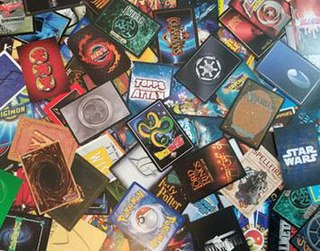
A collectible card game (CCG), also called a trading card game (TCG) among other names, is a type of card game that mixes strategic deck building elements with features of trading cards, introduced with Magic: The Gathering in 1993.

7 Wonders is a board game created by Antoine Bauza in 2010 and originally published by Repos Production. Three decks of cards featuring images of historical civilizations, armed conflicts, and commercial activity are used in the card drafting game 7 Wonders. The game received critical success upon its release, and won numerous awards, including the inaugural Kennerspiel des Jahres connoisseurs' award in 2011.
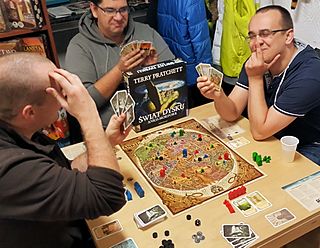
Discworld: Ankh Morpork is a board game set in the largest city-state in Terry Pratchett's Discworld. Designed by Martin Wallace and Treefrog Games, the game revolves around the playing of cards and placing minions onto the board. Each player attempts to meet the win condition for the personality that they randomly and secretly selected at the start of the game. The game features many characters from the Discworld series, but players do not need to have any knowledge about the books.
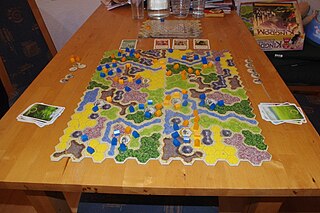
Kingdom Builder is a strategy board game designed by Donald X. Vaccarino, published in 2011 by Queen Games with illustrations by Oliver Schlemmer in German, British and international versions.

Legends of the Three Kingdoms, or sometimes Sanguosha, LTK for short, is a Chinese card game based on the Three Kingdoms period of China and the semi-fictional 14th century novel Romance of the Three Kingdoms (ROTK) by Luo Guanzhong. The rules of the basic LTK are almost identical to the rules of the older Italian card game Bang!. LTK was released by YOKA games (游卡桌游) on January 1, 2008, and has been followed to date by a total of seven official expansion sets, an online version LTK Online, as well as a children's version LTK Q Version. There are self-created cards by players, but these are mostly unofficial.
A roguelike deck-building game is a hybrid genre of video games that combines the nature of deck-building card games with procedural-generated randomness from roguelike games.


















